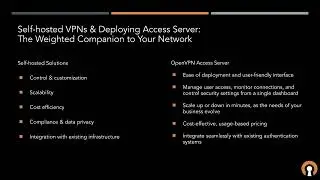How to Launch Access Server on Docker Container
Learn more about Access Server: https://openvpn.net/access-server/?ut...
This video provides a comprehensive guide on how to deploy an Access Server within a Docker container. Docker, a widely-used tool among system administrators, allows for the deployment of applications in isolated environments known as containers. These containers operate on the host operating system with significantly lower overhead than traditional virtual machines, making them an efficient choice for testing and deployment.
Once you have successfully installed the Access Server in a Docker container, it encompasses three main components:
1. VPN Server Software: This is built on the highly regarded OpenVPN open-source software, which is known for its reliability and robust security features.
2. User-Friendly Web Interfaces: These interfaces are designed to be intuitive, making it easier for administrators to manage the VPN settings and for users to adjust their preferences without extensive technical knowledge.
3. Client Software Compatibility: The Access Server supports a wide range of operating systems, providing client software for Windows, macOS, Android, iOS, and Linux. This compatibility ensures that users can connect to the VPN from almost any device or operating system.
Using Docker to run your Access Server provides a scalable and secure way to manage network access and monitor VPN performance. This setup not only streamlines the process of software deployment but also enhances the security and flexibility of managing your network's access points.
For mroe info: https://bit.ly/4bsncio































